Research on design trends of intelligent cockpits: explore 3D, integrated interaction.
In 2022, multiple automakers have released new concept car models, showing their vision and understanding of future smart cars and providing innovative ideas for the development of future intelligent cockpits. For example, in early 2022, Mercedes-Benz unveiled ISION EQXX, a new concept car that displays a new interior cockpit concept. As well as lightweight, sustainable materials, this car packs a 47.5-inch completely seamless ultrathin one-piece display (with an 8K resolution and the backlight consisting of more than 3000 local dimming zones) and introduces game engines and fully optimized user interfaces. As concerns HMI design, the system mounted on the car is structured along neuromorphic principles and adopts an intuitive working method that mimics the workings of the human brain.
In November 2022, Yanfeng introduced XiM23, a new concept car that interprets the company’s understanding of future luxury cockpits: a through-type extended curved display (dashboard + 2 center console screens) that can be hidden and lifted + a lifting multi-functional Phygital controller (display + knob, with gesture control and interactive smart surface features). In terms of driving modes, this car (with L2 driving assistance functions) offers two default manual driving modes, Calm and Rich, and the L4 autonomous driving mode.
In addition to concept cars, there are also a number of innovative models launched on market in 2022. In particular, the cars from emerging carmakers, such as Li Auto L9, AITO M7, Avatr 11 and Jidu ROBO-01 Lunar Edition, bear new products and technologies including human-computer interaction, displays, seats, sound effects, ambient lights, and smart surfaces. New technologies, new scenarios and new modes are springing up.
Li Auto’s second model, L9, was rolled out in June 2022. With interiors laid out with new technological thinking, this car enables five-screen three-dimensional space interaction. The second-row central screen cancels the conventional instrument panel design, and the information content of the dashboard is distributed to the small-sized display in the center of the steering wheel, and HUD, offering intuitive, simple and direct experience.
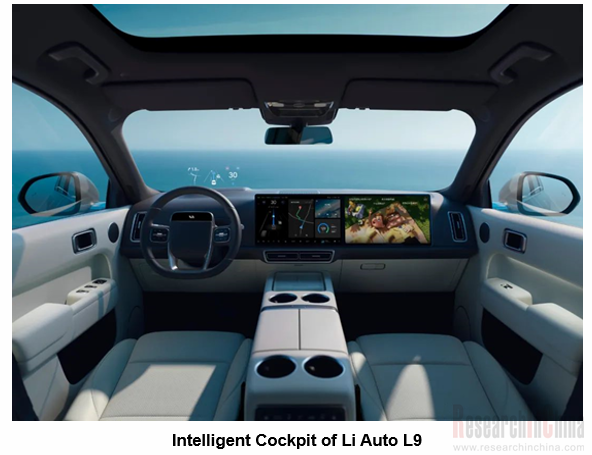
Jidu ROBO-01 Lunar Edition released in November 2022 packs a 35.6-inch integrated display with a high color gamut of 95% NTSC and an ultrahigh contrast ratio of 10,000:1, as well as a 3D immersive cockpit with voice and user emotion recognition capabilities. This car can interact with the outside world about its own state and emotions. Its robotized front face design integrates interactive AI pixel headlights and an AI voice interaction system with a high recognition rate. The external voice recognition function enables the natural communication between people, vehicle and environment.
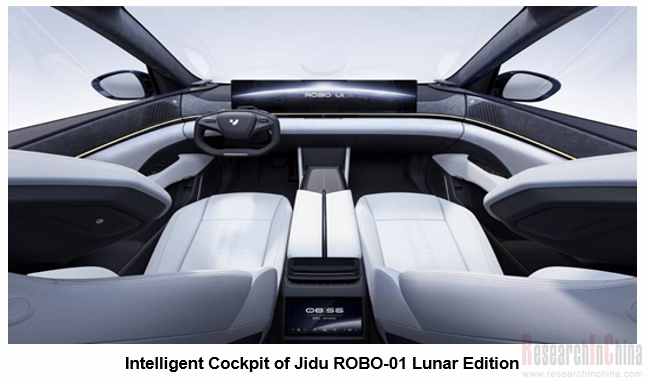
The intelligent cockpit is a space that provides users with human, vehicle and environment needs and information interaction. The intelligent vehicle consumption upgrade favors the interaction mode switching from the conventional flat, relatively independent interaction mode to the three-dimensional integrated interaction mode. Continuous efforts will be made to explore the demand for emotional interaction and human-vehicle “resonance”. Moreover users have ever greater demand for personalized car services and emotional interaction. The development of intelligent cockpits lays more stress on personalized space, and friendly interaction and services.
3D Unreal Engine is applied, and human-machine interface offers more three-dimensional, intuitive and convenient interaction.
As an open real-time 3D creation platform, Unreal Engine has found broad application in automotive design and engineering, especially in human-computer interaction. An increasing number of automakers have partaken in the joint development with Unreal Engine. The likes of Mercedes-Benz, Nissan, GM, SAIC IM Motors, and Xpeng Motors all use Unreal Engine in their intelligent cockpits to make the interaction more intuitive and three-dimensional and improve cockpit immersive experience and driving safety.
IM L7, launched on market in 2022, bears a 3D user interface (UI) co-created by Banma Zhixing and Unity. It supports multi-screen streaming and cross-screen display of 3D applications, 3D visualization of the car control interface, and 3D particle dynamic effects on the air-conditioner interface, intelligent driving HD map display, and immersive games that combine vehicle information and multi-mode interaction.
Xpeng G9, marketed in 2022, carries 3D UI for human-computer interaction. Developed with Unity 3D rendering engine, this feature enables control on suspension, air conditioners, windows, trunk and ambient lights via the 3D car model touch screen in the car control display. Moreover the new interaction system can render 3D maps in real time to improve navigation accuracy, and also allows users to control car details such as windows and suspension through the large display, a visible way.
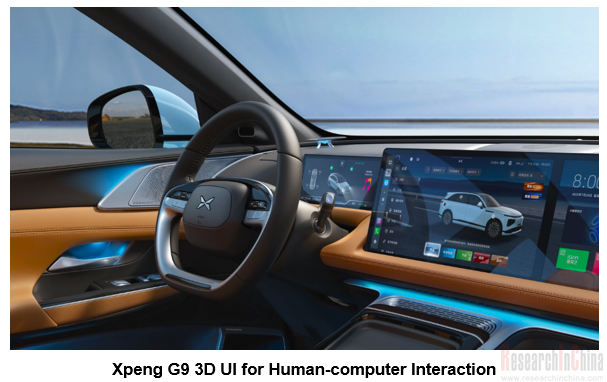
The intelligent cockpit design of the new 7th-generation Ford Mustang launched in 2022 is inspired by fighter jets. The car is equipped with two displays developed with the 3D Unreal Engine platform, and supports customizable functions such as animation design and new driving mode display interface.
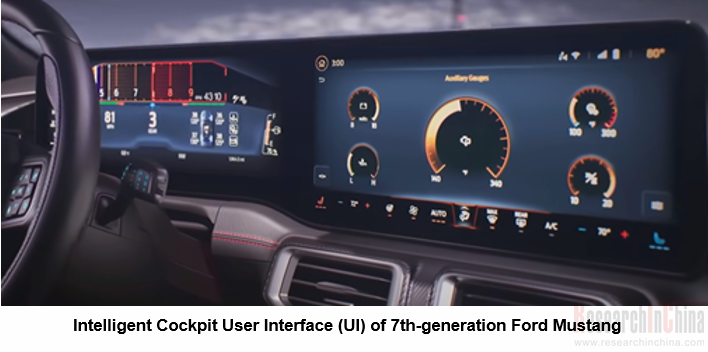
The future Unreal Engine is likely to become a general-purpose next-generation engine that empowers the automotive industry, and provides creation teams with efficient cooperative productivity and better interaction experience to bring the creativity of designers into full play.
The cockpit scenario mode design tends to be personalized, user-defined and all-scenario integrated.
Scenario mode is a major development trend of future intelligent cockpits. There are mainly two types of modes: interior scenario, and interior and exterior combined scenario. In terms of interior scenario mode, currently new car models enable simple scenario interaction through intelligent configurations such as voice, ambient lights, and multi-functional seats. For instance, when the nap mode available in most car models is turned on, the driver's seat will automatically "lay flat", the air conditioner will automatically open and the lights, windows, sunroof, and visors will all be closed; after the timing ends, there will be a music alarm, and the seat will return to its original state after clicking the end.
In the trend for software-defined vehicles and service-oriented architecture (SOA) design, this mode supports editing of intelligent scenarios on the intelligent cockpit screens. Many new car functions are not always developed from scratch, but as for a number of simple functions based on intelligent scenario combination, the SOA software architecture allows OEMs to abstract each minimum function into atomic services, and freely combine them into a more intelligent scenario-based function by way of service calling. The trend for user-defined, personalized intelligent cockpit scenarios becomes ever more obvious.
IM L7 that features IMOS and Onehit scenario-based experience design allows car owners to combine vehicle control items into their own exclusive modes. For example, it enables one-button definition of the female owner welcoming and built-in nap mode that supports one-button control on seats, air conditioner and fragrance, and display of the teamLab-customized flowering dynamic effect on the screen, so as to offer immersive relaxation experience, while in the pet mode, the system automatically adjusts the air conditioner ventilation to create a comfortable environment for the pet. Furthermore, the ISC at the front and rear of the car can express the state of the pet in the car in a warmly manner, so as not to worry passersby.
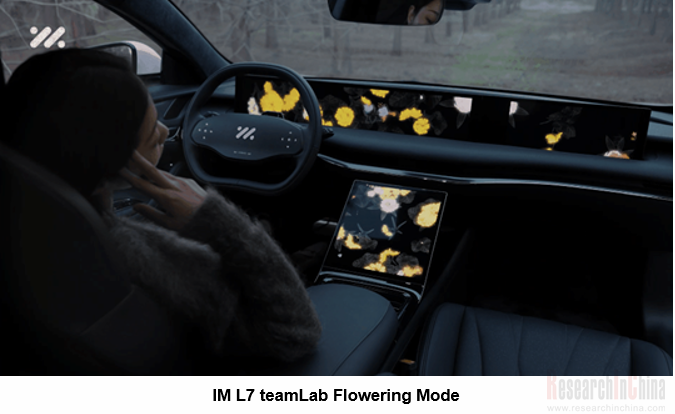
In addition, as new technologies are adopted and autonomous driving matures, in the future cockpit scenarios will evolve from single scenarios to multi-scenario integration to meet user needs. In different scenarios, the changing interior space facilitates the expansion of the interior modes, which can be converted according to different scenarios of driving, rest, and office. When the user needs a rest, the steering wheel can be retracted, and the seat can be folded down or even become a bed; when the user needs to communicate with other occupants or entertain, the seat can be rotated; when the user needs to watch a movie, the entire window or windshield can turn into a large display.
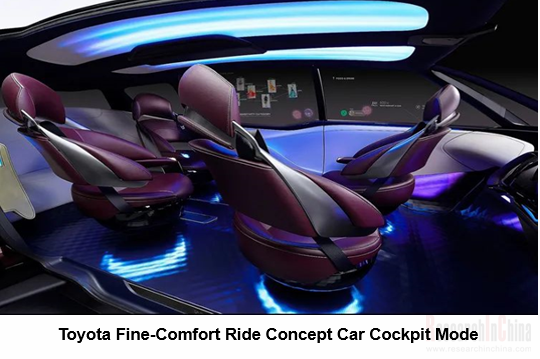
The vehicle cockpit game market is flourishing, and the market demand is waiting to be unleashed.
As intelligent driving advances, the entertainment functions of intelligent cockpits are being developed. In recent years, multiple automakers like Tesla, Audi, Mercedes-Benz, GAC, Great Wall Motor, BYD and Li Auto have begun to deploy vehicle games. Among them, Tesla is a pioneer. In June 2019, Tesla introduced the Arcade Game Platform in which users can access a variety of Atari games via the center console screen, and then the real-time game OTA updates are available. In June 2021, Tesla demonstrated the 3A masterpiece game "Cyberpunk 2077" at the Model S Plaid Launch. In July 2022, Tesla announced that it would integrate the Steam game platform into the car, allowing users to experience a mass of Steam games in the car.
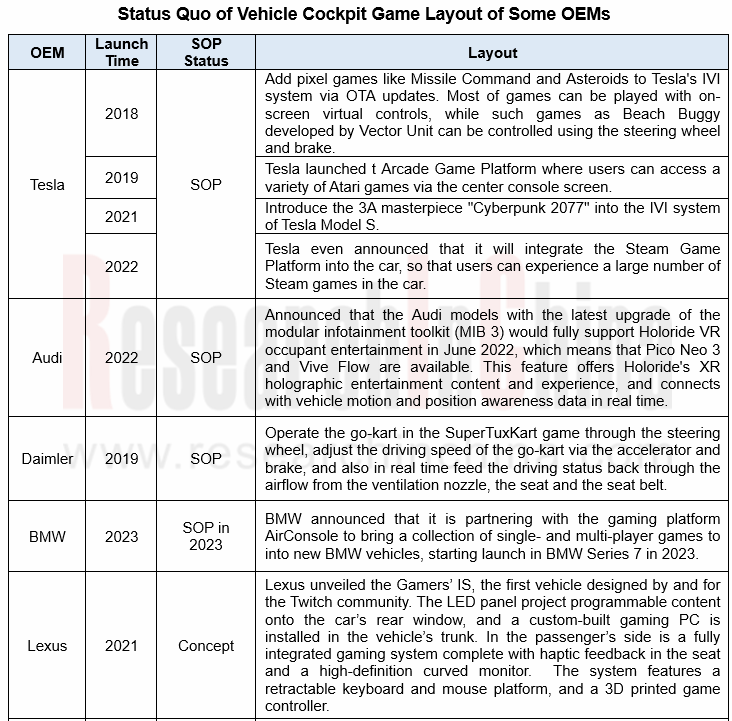
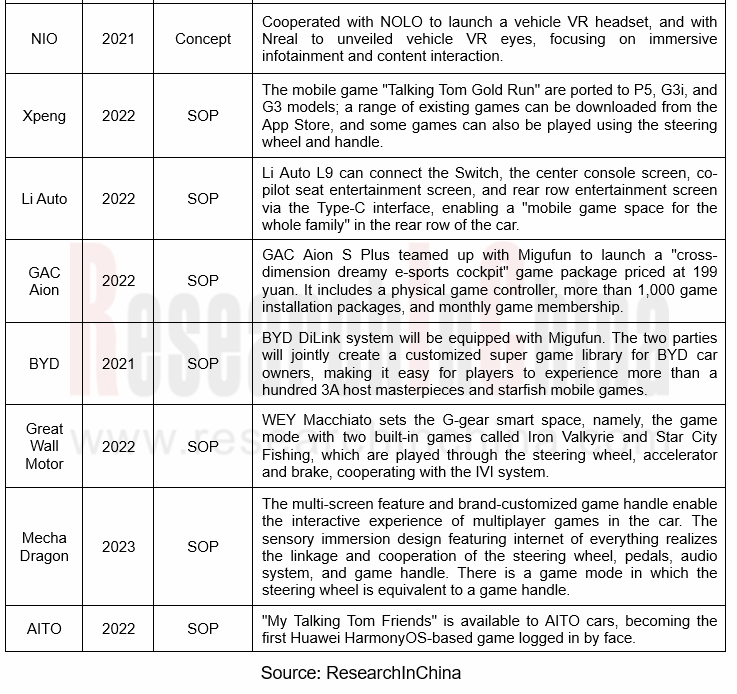
The entertainment system of Li Auto L9, a new model launched in 2022, supports connection and mirroring of Switch and other game console devices, turning the car into a "mobile game space for the whole family" and bringing consumers better ride experience. The 220V power supply of Li Auto L9, equipped with the HDMI-Type-C adapter cable, allows users to play all kinds of game consoles and 3A masterpieces in the car.
At present, the demand for vehicle games has yet to be unleashed, but when the maturing autonomous driving technologies enable hands-free driving, the demand for vehicle games will usher in a boom period. It is expected that the penetration rate of vehicle games will be higher than 20% after L4 autonomous driving comes into service.
In the future, the maturing intelligent and autonomous driving technologies will help to make vehicles large mobile intelligent terminals; vehicle games will trend to provide more spatial and immersive experience; the forms and types of games will also become more diversified.
China Automotive Lighting and Ambient Lighting System Research Report, 2025
Automotive Lighting System Research: In 2025H1, Autonomous Driving System (ADS) Marker Lamps Saw an 11-Fold Year-on-Year Growth and the Installation Rate of Automotive LED Lighting Approached 90...
Ecological Domain and Automotive Hardware Expansion Research Report, 2025
ResearchInChina has released the Ecological Domain and Automotive Hardware Expansion Research Report, 2025, which delves into the application of various automotive extended hardware, supplier ecologic...
Automotive Seating Innovation Technology Trend Research Report, 2025
Automotive Seating Research: With Popularization of Comfort Functions, How to Properly "Stack Functions" for Seating?
This report studies the status quo of seating technologies and functions in aspe...
Research Report on Chinese Suppliers’ Overseas Layout of Intelligent Driving, 2025
Research on Overseas Layout of Intelligent Driving: There Are Multiple Challenges in Overseas Layout, and Light-Asset Cooperation with Foreign Suppliers Emerges as the Optimal Solution at Present
20...
High-Voltage Power Supply in New Energy Vehicle (BMS, BDU, Relay, Integrated Battery Box) Research Report, 2025
The high-voltage power supply system is a core component of new energy vehicles. The battery pack serves as the central energy source, with the capacity of power battery affecting the vehicle's range,...
Automotive Radio Frequency System-on-Chip (RF SoC) and Module Research Report, 2025
Automotive RF SoC Research: The Pace of Introducing "Nerve Endings" such as UWB, NTN Satellite Communication, NearLink, and WIFI into Intelligent Vehicles Quickens
RF SoC (Radio Frequency Syst...
Automotive Power Management ICs and Signal Chain Chips Industry Research Report, 2025
Analog chips are used to process continuous analog signals from the natural world, such as light, sound, electricity/magnetism, position/speed/acceleration, and temperature. They are mainly composed o...
Global and China Electronic Rearview Mirror Industry Report, 2025
Based on the installation location, electronic rearview mirrors can be divided into electronic interior rearview mirrors (i.e., streaming media rearview mirrors) and electronic exterior rearview mirro...
Intelligent Cockpit Tier 1 Supplier Research Report, 2025 (Chinese Companies)
Intelligent Cockpit Tier1 Suppliers Research: Emerging AI Cockpit Products Fuel Layout of Full-Scenario Cockpit Ecosystem
This report mainly analyzes the current layout, innovative products, and deve...
Next-generation Central and Zonal Communication Network Topology and Chip Industry Research Report, 2025
The automotive E/E architecture is evolving towards a "central computing + zonal control" architecture, where the central computing platform is responsible for high-computing-power tasks, and zonal co...
Vehicle-road-cloud Integration and C-V2X Industry Research Report, 2025
Vehicle-side C-V2X Application Scenarios: Transition from R16 to R17, Providing a Communication Base for High-level Autonomous Driving, with the C-V2X On-board Explosion Period Approaching
In 2024, t...
Intelligent Cockpit Patent Analysis Report, 2025
Patent Trend: Three Major Directions of Intelligent Cockpits in 2025
This report explores the development trends of cutting-edge intelligent cockpits from the perspective of patents. The research sco...
Smart Car Information Security (Cybersecurity and Data Security) Research Report, 2025
Research on Automotive Information Security: AI Fusion Intelligent Protection and Ecological Collaboration Ensure Cybersecurity and Data Security
At present, what are the security risks faced by inte...
New Energy Vehicle 800-1000V High-Voltage Architecture and Supply Chain Research Report, 2025
Research on 800-1000V Architecture: to be installed in over 7 million vehicles in 2030, marking the arrival of the era of full-domain high voltage and megawatt supercharging.
In 2025, the 800-1000V h...
Foreign Tier 1 ADAS Suppliers Industry Research Report 2025
Research on Overseas Tier 1 ADAS Suppliers: Three Paths for Foreign Enterprises to Transfer to NOA
Foreign Tier 1 ADAS suppliers are obviously lagging behind in the field of NOA.
In 2024, Aptiv (2.6...
VLA Large Model Applications in Automotive and Robotics Research Report, 2025
ResearchInChina releases "VLA Large Model Applications in Automotive and Robotics Research Report, 2025": The report summarizes and analyzes the technical origin, development stages, application cases...
OEMs’ Next-generation In-vehicle Infotainment (IVI) System Trends Report, 2025
ResearchInChina releases the "OEMs’ Next-generation In-vehicle Infotainment (IVI) System Trends Report, 2025", which sorts out iterative development context of mainstream automakers in terms of infota...
Autonomous Driving SoC Research Report, 2025
High-level intelligent driving penetration continues to increase, with large-scale upgrading of intelligent driving SoC in 2025
In 2024, the total sales volume of domestic passenger cars in China was...